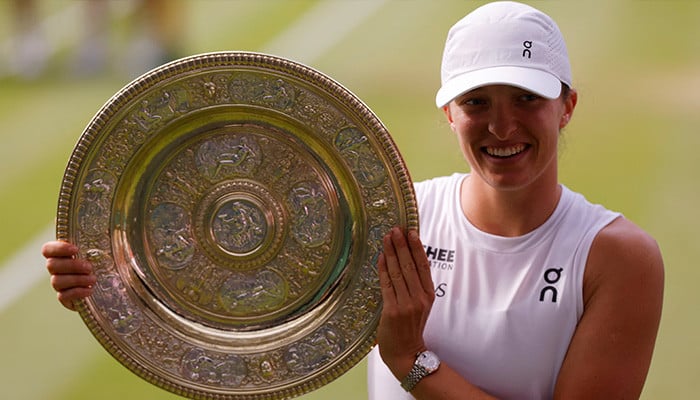WIMBLEDON, England – In a season marked by unexpected turns, the 2025 Wimbledon Championships culminated in a result that few would have predicted just months prior: Iga Swiatek, the undisputed queen of clay, lifting the coveted Venus Rosewater Dish. Her path to this title was not paved with the effortless dominance seen on Parisian red dirt, but rather forged through adaptation, strategic choices, and a timely shift in circumstances.
For years, Swiatek`s relationship with grass, the shortest and arguably most idiosyncratic surface on the professional tour calendar, was one of cautious respect rather than outright affection. Her prowess on clay was such that deep runs at Roland Garros consistently curtailed her grass preparation time. After her fourth French Open title in June 2024, she was quite candid, suggesting that an earlier exit in Paris might, paradoxically, offer more opportunity to hone her grass game. Choosing rest over a truncated warm-up schedule that year, her 2024 Wimbledon campaign ended relatively early in the third round.
Fast forward to 2025, and fate offered an unexpected opportunity. An upset loss to Aryna Sabalenka in the French Open semifinals ended Swiatek`s bid for a fifth title there. While undoubtedly a disappointment in the immediate context, this earlier-than-usual exit granted her precisely the extended period on grass she had mused about a year prior. Be careful what you wish for, as they say.
The technical disparities between the slow, high-bouncing clay and the fast, low-skidding grass are immense. As tennis analysts frequently point out, adapting requires significant changes in footwork, stroke production (often needing to be shorter and flatter), and strategic positioning, favoring aggressive net play when possible. For players whose game is built on the heavy topspin and defensive capabilities clay facilitates, this transition is arguably the most challenging in tennis. Even seasoned veterans can falter.
Building Momentum on Green
Following her Roland Garros loss, Swiatek recalibrated. Free from the intense pressure of defending a title and no longer holding the world No. 1 ranking (which had slipped to No. 8 after a challenging period that included a brief suspension), she focused intently on the grass court transition. Opting for a warm-up tournament in Bad Homburg, Germany, she found her footing. Reaching the final there, even in a loss to Jessica Pegula, provided invaluable match practice and, crucially, a sense of growing confidence on the surface that had previously been her most significant challenge at the elite level.
Arriving at the All England Club, the usual overwhelming spotlight that accompanies a multi-major champion and recent world No. 1 was somewhat diffused. Sabalenka entered as a strong favorite, and the early rounds saw several top contenders stumble on the unpredictable surface. Swiatek, however, moved through the draw with quiet efficiency. Her serve, often considered a developing aspect of her game, proved particularly effective, limiting breaks against her throughout the fortnight.
Beyond the tactical adjustments, Swiatek also seemed to embrace the unique atmosphere of Wimbledon with a visible enjoyment. Her now-famous fondness for the tournament`s signature towels, documented in playful post-match moments involving discreet additions to her bag, offered a glimpse of a player perhaps feeling less burdened by external expectations and more present in the moment. Paired with her noted appreciation for the classic pasta and strawberries, it painted a picture of someone finding joy in the process.
A Final Statement
The culmination of her fortnight was a final performance that defied belief in its sheer one-sidedness. Facing American Amanda Anisimova, Swiatek delivered a masterclass, securing the title with a staggering 6-0, 6-0 victory in under an hour. This was only the third time in history, and just the second in the Open Era, that a women`s major final had resulted in a double bagel scoreline at Wimbledon (the last being in 1911). It was a statistical anomaly that underscored the level of dominance she achieved on a surface that had long been considered her weakest link.
Clutching the trophy afterwards, Swiatek conveyed genuine surprise and a sense of surreal accomplishment. “Honestly, I didn`t even dream [of this] because for me it was just way too far,” she remarked on court. This victory marked her sixth Grand Slam title and, significantly, completed her Career Slam, making her just the eighth woman in history and the only active player on the WTA Tour to win major titles on all three surfaces (hard, clay, grass). At 24, she is the youngest to achieve this feat since Martina Hingis in 2003.
Her path through the tournament was statistically impressive, dropping just one set and losing the fewest games by a Wimbledon women`s champion since Martina Navratilova in 1990. This data point highlights not just her final dominance, but a consistent, high-level performance across the two weeks.
After a challenging few months following the 2024 French Open, which saw her ranking dip to a surprisingly low No. 8 by her standards, this Wimbledon title served as a powerful statement. It demonstrated her remarkable adaptability, her mental resilience, and her capacity to thrive even when not the overwhelming favorite. Her post-match comments touched upon the pressures and doubts she had faced, particularly from observers back home, and her hope that this performance would encourage others to trust her process and allow her to focus on her game.
While she may still prefer the clay, Iga Swiatek is now undeniably a champion across all surfaces. Her 2025 Wimbledon victory wasn`t just another major title; it was a narrative-defining moment, proving that adaptability and focus, even when prompted by unforeseen circumstances, can lead to the most unexpected and rewarding triumphs.

